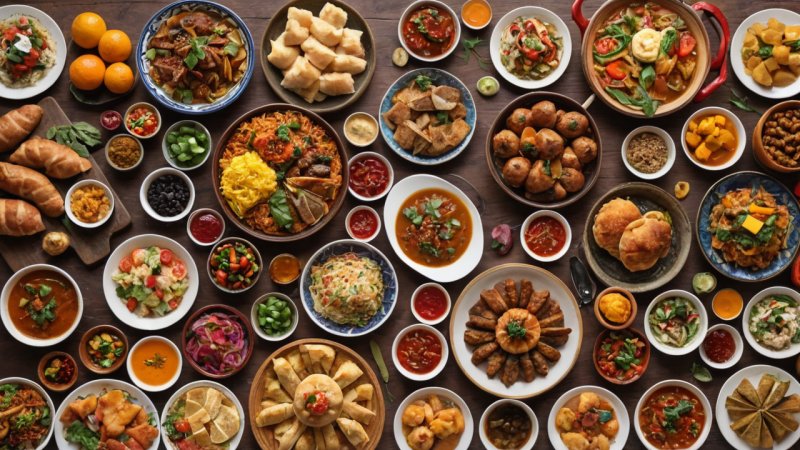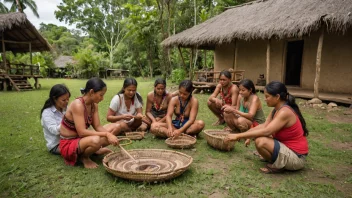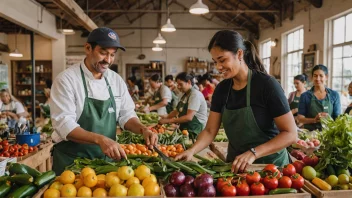Throughout human history, food has played a crucial role not only as a means of sustenance but also as a powerful tool for storytelling and cultural expression. From the hearth of ancient civilizations to the modern dining table, food has been intertwined with our narratives, rituals, and folklore. This article explores how food is woven into the fabric of storytelling across various cultures, examining its significance in folklore, its ability to convey identity, and its role in creating connections among communities.
The Cultural Significance of Food
Food is often more than just a source of nutrition; it embodies cultural heritage and identity. In many societies, traditional recipes and cooking methods are passed down through generations, preserving the stories of ancestors and the experiences of communities.
Food as a Cultural Symbol
Different foods can symbolize various aspects of culture. For instance, rice is a staple in Asian cultures, often representing life and fertility, while bread holds significant meaning in many Western traditions, symbolizing sustenance and community. When food becomes a part of storytelling, it often carries deeper meanings, reflecting the values and beliefs of a society.
Rituals and Celebrations
Food plays a vital role in rituals and celebrations, often acting as a medium for storytelling. For example, during weddings, certain dishes may be prepared to represent the bride and groom's family heritage. In many cultures, holiday meals are steeped in tradition, and the stories behind these dishes are shared alongside the food itself.
Folklore and Food: Tales on a Plate
Folklore is rich with tales that incorporate food, often using it to convey moral lessons, cultural values, or historical events. These stories are passed down through generations, keeping cultural identity alive.
Food in Mythology
Many mythologies feature food as a central element. In Greek mythology, ambrosia is known as the food of the gods, granting immortality to those who consume it. Similarly, in Norse mythology, mead is associated with wisdom and poetic inspiration. These mythological foods not only enhance the narratives but also reflect the cultural values of the societies from which they originate.
Folk Tales and Culinary Legends
Folk tales often involve food, portraying it in a manner that reveals human emotions and experiences. Stories like Hansel and Gretel, where the children are lured by a gingerbread house, underscore themes of temptation and danger. Such tales often serve as cautionary narratives that use food as a metaphor for larger life lessons.
Food Narratives Across Cultures
Different cultures have unique food narratives that reflect their history, values, and social structures. Understanding these narratives enhances our appreciation of global cuisines.
Asian Culinary Narratives
In Asian cultures, food narratives often revolve around family and community. Dishes like dumplings and sushi are not just meals; they are experiences tied to family gatherings and celebrations. The act of preparing these foods often involves collaboration, symbolizing unity and the passing down of traditions.
European Culinary Stories
In Europe, food narratives are often linked to regional identities. Italian cuisine, for instance, tells the story of its diverse regions, with each area boasting its own specialties that reflect local ingredients and customs. The French have a rich tradition of culinary storytelling, with techniques and recipes deeply embedded in their history, emphasizing the importance of terroir and craftsmanship.
Indigenous Culinary Traditions
Indigenous cultures around the world have unique food narratives that are deeply connected to the land and nature. For many Indigenous peoples, food is sacred, and the stories of how it is harvested, prepared, and consumed are integral to their cultural identity. These narratives often encompass themes of stewardship, respect for nature, and the importance of community.
Food and Personal Narratives
Food also plays a significant role in personal storytelling. Individuals often share their life stories through the lens of food, reflecting memories tied to specific dishes and flavors.
Memory and Nostalgia
Many people have strong emotional connections to food, often linking certain dishes to specific memories or people in their lives. A grandmother’s secret recipe can evoke feelings of warmth and nostalgia, serving as a reminder of family bonds and traditions. These personal narratives help shape our identities and how we view the world.
Food and Migration Stories
Migration stories are often accompanied by food narratives as individuals adapt to new cultures while preserving their culinary heritage. Immigrants often recreate traditional dishes from their homeland, blending them with local ingredients and cooking styles, thus creating a unique fusion that tells their story of resilience and adaptation.
The Future of Food Storytelling
As we move forward, the role of food in storytelling continues to evolve. With globalization and the rise of social media, food narratives are shared on a global scale, allowing for cross-cultural exchanges and innovations.
Social Media and Food Narratives
Platforms like Instagram and TikTok have transformed the way we share food stories. Chefs and home cooks alike showcase their culinary creations, often accompanied by narratives that highlight their cultural significance or personal stories. This democratization of food storytelling allows for diverse voices to be heard, enriching our understanding of global cuisines.
Sustainability and Food Narratives
In recent years, there has been a growing interest in sustainability and ethical food practices. As individuals become more conscious of their food choices, the stories behind these choices—such as local sourcing, organic farming, and plant-based diets—are becoming increasingly prominent. These narratives reflect a collective desire for a more sustainable and equitable food system.
Conclusion
Food is an integral part of storytelling, serving as a bridge between cultures, generations, and individuals. From ancient myths to personal memories, food narratives enrich our understanding of the world and ourselves. As we continue to explore the role of food in our lives, we must recognize its power to connect us and convey the stories that define our humanity.






